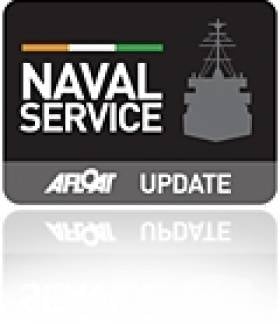The historic visit of HRH Queen Elizabeth II to Ireland today, has led to an increased level of security by the Defence Forces through the deployment of the air corps, army and the navy in addition to the Gardai.
On the naval front it is believed that two naval vessels are on duty for the arrival of the Queen to Dublin, marking the first of a four-day visit which is to include Cashel and Cork city. The last visit by the head of the British monarchy was 100 years ago when King George V and Queen Mary arrived by sea at Kingstown (Dun Laoghaire).
The most modern naval vessel of the eight-strong fleet the LÉ Niamh (P52) is an offshore patrol vessel (OPV) which is equipped with a bow-mounted 76mm gun. To see the crew undertake exercise-drills of the gun, watch the video below.





























































